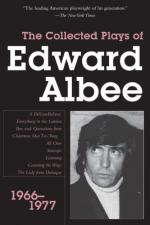|
This section contains 2,629 words (approx. 9 pages at 300 words per page) |

|
Albee transforms social "problems" for which no solution is offered into sexual and family strife, problems for which he has readily available solutions….
Two prominent problems resolved by the ending of Virginia Woolf concern the bitch goddess, who is tamed, and the non-existent child, who is "killed." Martha is a brilliantly constructed and dramatically sufficient portrait of the stereotypical emasculating woman. The missing male child is doubly non-existent, for he is first imaginary and at the end of the play he is also dead. It is no secret that parent-child and husband-wife relationships figure importantly in Albee's world, although Albee is squeamish about recognizing this. In fact, many relationships in his plays that do not specifically conform to family models can be assimilated to them. (p. 134)
Who's Afraid of Virginia Woolf ends with a now familiar tableau of an American first family and an Albeean primal family, a...
|
This section contains 2,629 words (approx. 9 pages at 300 words per page) |

|


